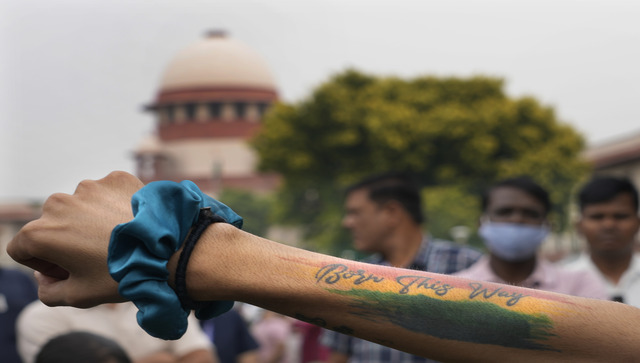The Supreme Court has refused to legalise same-sex marriage in India. A five-judge Constitution bench of the apex court on Tuesday (17 October) rejected the petitions seeking marriage equality in a 3:2 verdict, with the dissenting judges saying that the right to marry “cannot be considered a fundamental right.” However, the top court has recognised the rights of the queer community, asking the Centre to ensure they do not face discrimination. Observing that queerness is a “natural phenomenon,” Chief Justice of India (CJI) DY Chandrachud, who headed the five-judge bench, told the Centre, states and Union Territories (UTs) to make sure that the “queer community is not discriminated against because of their gender identity or sexual orientation.” The apex court also issued certain directives to the Centre and the police in this regard. What has the Supreme Court said? Let’s take a closer look. SC’s order for Centre, states Announcing his ruling, CJI Chandrachud noted that queerness is not an “urban or elitist concept” or “restricted to the upper classes of the society”.
“To imagine that queer people exist only in urban and elite spaces is to erase them."
Solicitor General Tushar Mehta, appearing for the Centre, had told the apex court earlier this year that same-sex marriage was an “urban” and “elitist” concept, which is “far removed from the social ethos of the country.” [caption id=“attachment_13261602” align=“alignnone” width=“640”] Image Courtesy: News18 Creative[/caption] The chief justice asked the Centre and state governments to ensure that the lesbian, gay, bisexual, transgender, queer, questioning, intersex, asexual (LGBTQIA+) community is not discriminated in access to goods and services. It asked the government to sensitise the public about queer rights as well as set up a hotline for the queer community. The court also called for establishing safe houses or Garima grih for queer couples. The apex court directed the Centre to ensure that inter-sex children are not forced to undergo sex change operations. The CJI said that queer people cannot be compelled to receive any hormonal therapy, reported Indian Express. ALSO READ:
Why the Supreme Court did not legalise same-sex marriage in India: The big takeaways SC’s ruling for police The top court’s instructions for the police hold significance. CJI Chandrachud has directed the police not to harass queer people by “summoning them to police stations solely to enquire about their sexual identity”. Queer persons should not be forced to return to their native families against their wishes, the apex court ruled. “The police should conduct a preliminary enquiry before registering an FIR against a queer couple over their relationship,” the bench observed, according to Hindustan Times (HT). As per Times of India (TOI), when queer persons lodge a complaint against their families accusing them of restricting their movement, the court told the police to ensure their movement is not curbed after “verifying the genuineness” of such allegations. The police must “ensure due protection” when a complainant alleges violence from the family because of their queer identity, or for being in a queer relationship after confirming the “genuineness” of the complaint. On ‘bouquet of rights’ CJI Chandrachud said towards the end of his judgement that the top court cannot strike down the provisions of the Special Marriage Act or read words differently to permit marriage equality and left the issue to the Parliament. However, he also argued that the “failure of the state to recognise the bouquet of rights flowing from a queer relationship amounts to discrimination”.
“Right to enter into union cannot be restricted on the basis of sexual orientation,” the CJI observed.
Justice Ravindra Bhat in the judgement signed by him and Justice Hima Kohli said the apex court cannot chalk out a legal framework for queer couples as that lies with the legislature. “All queer persons have the right to choose their partners. But the state cannot be obligated to recognise the bouquet of rights flowing from such a union. We disagree with the CJI on this aspect,” The Wire quoted Justice Bhat as saying. Despite the split verdict, the five-judge bench agreed to direct the Centre to form a high-level Cabinet committee to examine the “rights and entitlements of persons in queer unions” – without legally recognising their relationship as a “marriage”. [caption id=“attachment_13261652” align=“alignnone” width=“640”] LGBTQ community supporters and members wait for the Supreme Court verdict on petitions seeking legalisation of same-sex marriage, in Mumbai, on 17 October. AP[/caption] As per The Wire, CJI Chandrachud suggested the panel could consider the inclusion of queer couples as family in ration cards, allowing queer couples to name each other as nominees in bank accounts, etc. The panel may also analyse other rights for non-heterosexual couples, such as opening joint bank accounts, enabling queer people to nominate their partner as a beneficiary for provident fund, pension or inheritance, allowing queer couples to take medical decisions for each other, and so on. On 3 May, the Centre had told the top court it would set up a committee headed by the Cabinet secretary to look into measures that could address the “genuine concerns” of same-sex couples. The top court also had varied views on the queer couples’ right to
adopt , with CJI Chandrachud and Justice Sanjay Kishan Kaul in favour of giving them the option, and Justices Bhat, Kohli and PS Narasimha opposing it. The court delivered four separate judgements which, as the CJI described, carried “a degree of agreement and a degree of disagreement”. With inputs from agencies


)

)
)
)
)
)
)
)
)



